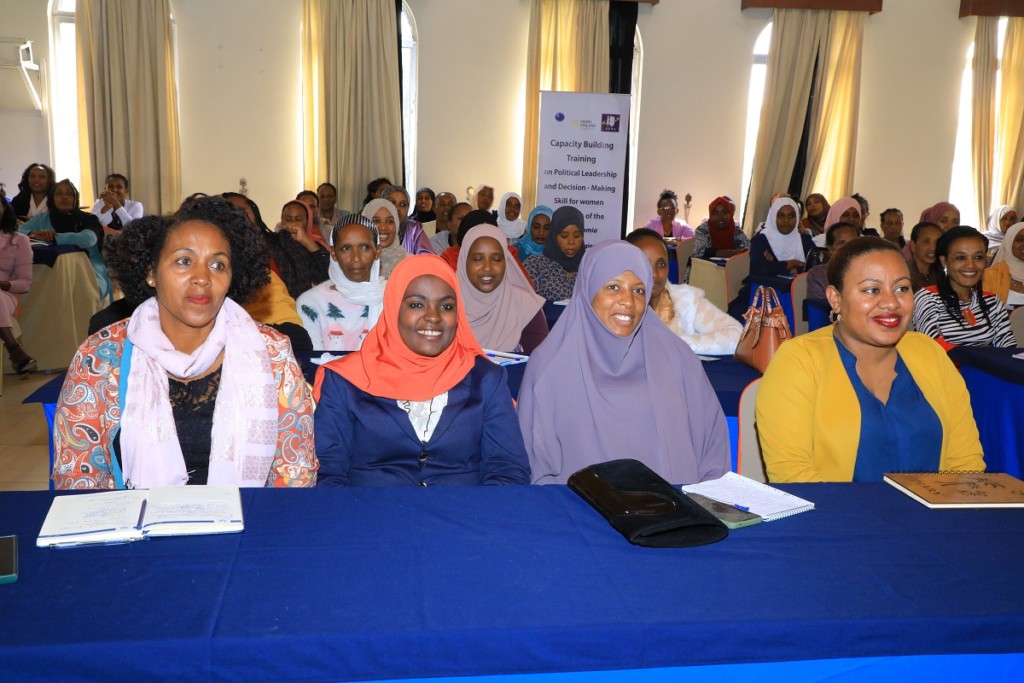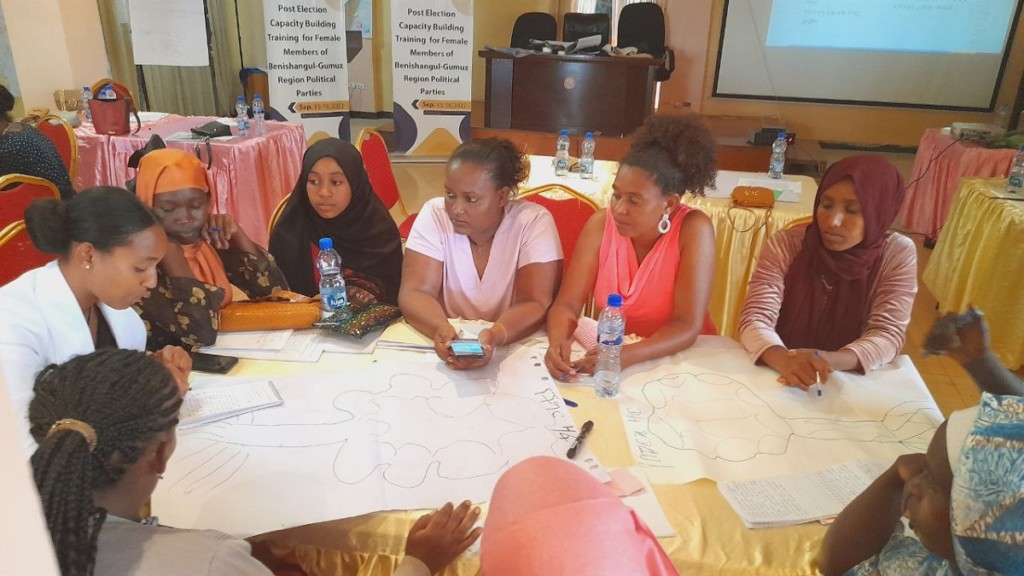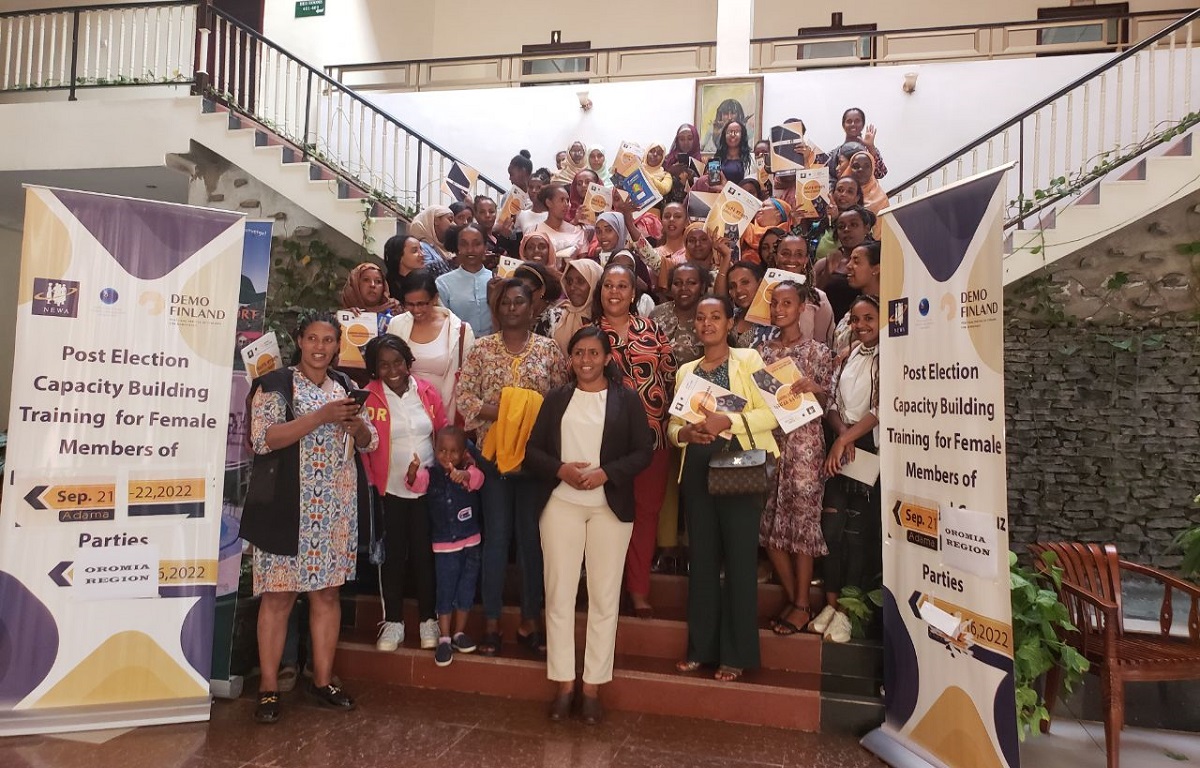Since 2019, Demo Finland has supported women’s political participation in Ethiopia together with its partner the Network of Ethiopian Women’s Associations (NEWA). The goal is that women are active in political parties and in various political decision-making processes, and a special focus in the first phase of the programme in 2021 was on the elections that were held after several delays.
An era of democratic reforms began in Ethiopia in 2018 but has stalled since the conflict between the Federal Government of Ethiopia and the armed forces of the Tigray region began in November 2020. The country suffers from a deep humanitarian crisis, in addition to which the economic situation is grim. The ceasefire agreement signed at the beginning of November 2022 brought a glimmer of hope, but many questions must still be resolved. According to the reports of the UN International Commission of Human Rights Experts on Ethiopia, the parties to the conflict have committed war crimes and crimes against humanity.
The elections, originally postponed due to COVID-19, were held in June 2021. They were reported to have been relatively peaceful considering the general security situation in Ethiopia and the conflict in Tigray. Some of the opposition parties, however, boycotted the elections. Due to the security situation, elections could not be held in all parts of the country in June, but they were held later at the end of the year, except for the Tigray region.
It is important to strengthen the competence and self-confidence of female politicians, so that the number of female candidates would increase in the future and so that women can truly make their voices heard in politics.
The proportion of women in the Parliament is 41.5%, which is a rather good number in international comparison. However, there are very few women in political party leadership. Obstacles to women’s participation include negative attitudes towards women’s political leadership. The most significant reason for women’s representation in the Parliament is the gender quotas of the country’s largest party, the Prosperity Party.

The number of women in the Parliament does not necessarily indicate the real opportunities for women to influence decision-making, if women have been elected or appointed to fill quotas. Also, the participation of female candidates in the 2021 elections decreased from the 2015 elections, which can be explained in part by the worsened security situation. It is therefore important to strengthen the competence and self-confidence of female politicians and party members, so that the number of female candidates would increase in the future and so that women can truly make their voices heard in politics. This is what Demo Finland and NEWA’s project will focus on in 2023.
Becoming decision-makers
Post-conflict peace building and the other crises require solutions, and it must be ensured that women are equally represented in all discussions and decision-making. Despite the conflict, Demo Finland and NEWA have been able to continue their work to strengthen women’s political participation. Workshops and trainings for female members of the political parties and meetings with the leadership of the parties have been organised in Addis Ababa, Oromia and Benishangul-Gumuz.
Before the elections, trainings for women candidates gathered participants from 14 different parties. According to the feedback, the self-confidence of the participants increased, helping them in campaigning. On the other hand, the participants also highlighted several challenges, such as the lack of campaign resources and concerns about the security situation.
Now the leaders of the political parties recognise the need to include women in the parties more strongly than before.
During the project’s few years of operation, a change has been observed in the attitude of the political party leadership towards the promotion of women’s participation. While the atmosphere was not very encouraging at the beginning of the co-operation, the commitment to promoting gender equality has grown. Now the leaders of the political parties recognise the need to include women in the parties more strongly than before. The increased self-confidence and competence of female politicians has also led to women taking initiatives to promote gender equality in their parties. The activity and initiative of the members of female politicians’ network has also increased. They have come up with new solutions for promoting women’s participation, and they have also created their own co-operation platforms, which has made communication easier and ensured that more female party members can be reached.
Women with disabilities are marginalised in politics
Women with disabilities are particularly marginalised and their voice is not heard in politics. Demo Finland, NEWA and the Ethiopian Women with Disabilities National Association (EWDNA) have promoted the inclusion of women with disabilities in the election process and supported the participation of women with disabilities as voters.
According to an assessment by EWDNA, in the 2021 elections, more attention was paid to the inclusion of persons with disabilities (PWDs) than before. The National Election Board of Ethiopia (NEBE) provided training for non-governmental organisations, media and election officials about the inclusion of PWDs, produced materials on election laws in an accessible format, and supported political parties in the inclusion of PWDs. Despite the improvements, there were several challenges: inaccessibility issues at polling stations, small number of candidates with disabilities, and the low self-confidence of PWDs that prevents them from participating in politics.
960 women with disabilities participated in events that encouraged them to exercise their right to vote.
Before the elections, EWDNA supported the participation of women with disabilities as voters by organising trainings for trainers, which focused on, for example, governance structures, the electoral system, citizens’ rights and responsibilities and voting practices. Based on these trainings, EWDNA members held coffee discussion sessions in different locations, encouraging women with disabilities to exercise their right to vote. A total of 960 women with disabilities participated in the events.
In addition, EWDNA reached out to female voters with disabilities through a radio program and materials in braille as well as audiovisual material. Through EWDNA, 15 women with disabilities also participated in election observation. The work resulted in more visibility in the mainstream media for the rights of PWDs in elections, and many of EWDNA’s members, who were previously not very interested in elections or had bad experiences due to inaccessibility issues, became active in the June 2021 elections.

The programme will continue in 2023 and 2024 with the aim of deepening the opportunities for women’s meaningful political participation and the capacity of female politicians both at the national level (Addis Ababa) and in the regions of Oromia and Benishangul-Gumuz. Permanent change requires long-term support as well as continuous commitment from parties to increase women’s influence in politics.

